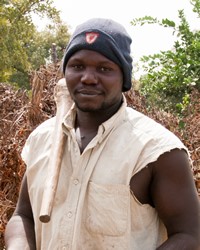Duun, Samogo in Mali

Photo Source:
World Agroforestry - Flickr
Creative Commons
|
Send Joshua Project a map of this people group.
|
| People Name: | Duun, Samogo |
| Country: | Mali |
| 10/40 Window: | Yes |
| Population: | 198,000 |
| World Population: | 198,000 |
| Primary Language: | Duungooma |
| Primary Religion: | Islam |
| Christian Adherents: | 0.30 % |
| Evangelicals: | 0.28 % |
| Scripture: | Translation Started |
| Ministry Resources: | No |
| Jesus Film: | No |
| Audio Recordings: | No |
| People Cluster: | Mande |
| Affinity Bloc: | Sub-Saharan Peoples |
| Progress Level: |
|
Introduction / History
The Dunn people live in the African country of Mali near the border of Burkina Faso. The climate is hot and dry. The temperature can reach above 100ºF in the hot season.
The Duun would prefer to live near the rivers because the vegetation is thicker and the heat is more bearable. However, the tsetse fly (which carries sleeping sickness) and the simulium fly (which carries river blindness) live near the rivers. These insects make the river areas almost uninhabitable and cause many Duun to suffer from associated medical problems.
What Are Their Lives Like?
For the Duun, the household is the basic economic unit. The villages are large and usually highly populated. Houses are rectangular with flat roofs, much like those of neighboring tribes. Duun villages have dome-shaped granaries which rise above the village walls. Each village may have at least 100 of these granaries. Every village has a headman who acts as the authority to family lineages, rather than as the authority to individual households.
Duun society is patrilineal in structure. This means the lines of descent are traced through the fathers. Private property is inherited by the eldest son, while household property is passed to the younger brother of the father. Married sons attach their households to the household of their father.
When a girl marries, the girl's family does not require a bride-price, as families in other West African tribes do. Instead, the groom gives premarital gifts to the girl's family. The gifts are usually animals such as chickens or goats. Like many other tribes in West Africa, the men sometimes practice polygamy, the marrying of several wives.
What Are Their Beliefs?
The majority of the Duun practice various ethnic religions, and a sizable minority are Muslim. Those who are Muslim hold to the five essential duties of Islam: (1) Affirming that "there is no god but Allah and Mohammed is his prophet;" (2) praying five times a day while facing Mecca; (3) giving alms generously; (4) fasting during Ramadan, the ninth month of the Muslim year; and (5) trying to make at least one pilgrimage to Mecca in their lifetime.
Like many other West African tribes, the Duun practice the tradition of worshiping dead ancestors. The people also believe that the "supreme god" is too distant to worship directly and that, therefore, the only way to serve him or to worship him is through a spirit. Consequently, a Duun will worship a statue or another object believed to house a spirit. The spirit, in return, will supposedly give the worship to the supreme god on behalf of the tribesman.
What Are Their Needs?
The Duun need much prayer and further discipling so they may learn the reality of God's love.
Prayer Points
The Scriptures are being translated and broadcast via radio as of August, 2024. Praise the Lord for those few who now believe.
Several communities of new believers are discovering how to follow Christ. Please pray for those who hear the regional broadcasts, that they may believe.
Please pray for the groups of new believers that the Lord will raise up local leaders and teachers among them.